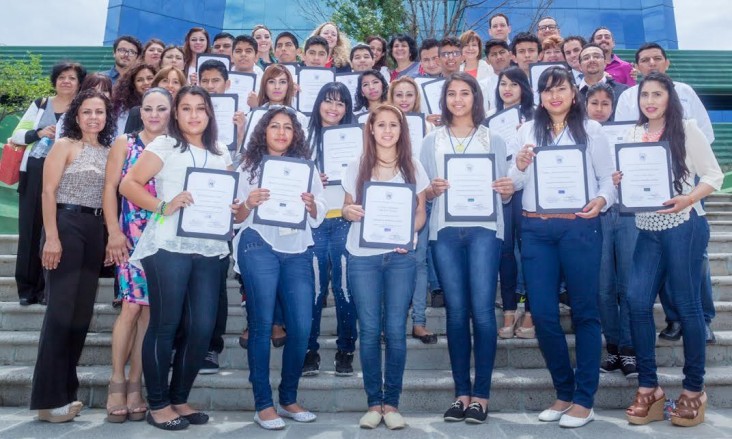Speeches Shim

April 2016—Mexican youth are finding new ways to overcome the violence, crime and unemployment in their communities. As they turn toward training and educational opportunities, they are turning away from the limitations of their circumstances.
Heriberto Ortiz, 26, is one of 120 youth supported by USAID’s Jóvenes con Rumbo (JcR) program designed to address crime and youth unemployment in Mexico’s marginalized communities.
Ortiz was born in Camino Verde, Tijuana, a community that struggles with high rates of crime and violence that often lead to the marginalization of vulnerable youth. His mother, a single parent, had to work full time to support him. In addition, Ortiz had to live with an aunt for most of his life, until she passed away from cancer.
While growing up, he faced challenges in school and was not able to even complete primary school.
Despite these setbacks, Ortiz showed a strong interest in computers and was always looking for opportunities to learn more about technology. He also enjoyed cooking at home and dreamed about working in a restaurant.
It was his interest in technology that first brought him to the USAID-funded JcR program, which is also known as Youth Pathways Mexico, in 2013. Under the program, Ortiz enrolled in an Intel information and communications technology (ICT) course. Along with the classes, Ortiz participated in human development and leadership activities and in an employment workshop that would help him find a job and support his family.
Following his outstanding performance in the ICT course, and with his interest in helping other youth from his community learn how to use computers, Ortiz was selected as a JcR program intern, where he served as an ICT facilitator for over a year.
With the help of his JcR tutors, he enrolled at the National Institute for Adult Education and obtained his primary and secondary education certificates.
As part of USAID’s Global Development Alliance (GDA), the JcR program is conducted in partnership with private sector company Nacional Monte de Piedad, YouthBuild International and Tecnológico de Monterrey (Monterrey Institute of Technology and Higher Education). To address the challenge of completing school and finding competitive jobs faced by a large number of Mexican youth, particularly those in high crime areas, the three partners help youth interested in learning hospitality and customer service trades to increase their technical skills and find higher paying jobs. Nacional Monte de Piedad offers scholarships to Tec de Monterrey online courses for youth from the program.
Ortiz was thrilled to learn of a way to link his two passions, computers and gastronomy, and was one of the first 20 youth from Tijuana to enroll in the Tec de Monterrey online courses in gastronomy and restaurant management. When he finished the six-month course, he and his peers from the program traveled to Monterrey to receive their Tec de Monterrey certificates—a trip paid for through private sector resources leveraged by YouthBuild International.
Thanks to this certification, Ortiz found a job as a cook at Mamamía Pizza in Tijuana, where he has been working for five months.
“The online courses helped me visualize my dreams and open doors that I thought were closed for me,” says Ortiz.
Thankful for the Nacional Monte de Piedad scholarship, the support of program tutors, and Tec de Monterrey’s teachers, Ortiz is committed to his job and working hard to become a restaurant manager.
USAID’s Jóvenes con Rumbo program runs from Sept. 2012 to March 2019.
LINKS

Comment
Make a general inquiry or suggest an improvement.